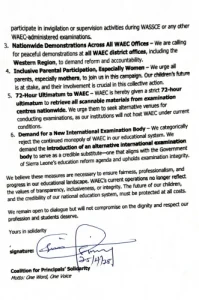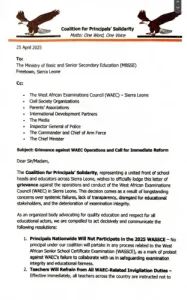Sierra Leone’s education system is in the throes of a crisis. Once lauded for its bold promise, it now stands accused of perpetrating radical exclusion. Over 40,000 pupils across 620 schools have been barred from taking the 2025 Basic Education Certificate Examination (BECE) due to missing Continuous Assessment Scores (CASs). This amounts to nearly a third of all registered candidates; a national disgrace that threatens the very future of our children and the credibility of our education system.
The figures are stark. A report from the West African Examinations Council (WAEC) dated May 6, 2025, laid bare the administrative and systemic rot at the heart of the crisis. From Freetown’s Albert Academy to Bo Commercial and Kabala Secondary School, the wave of exclusion cuts across public, private, and religious institutions, urban and rural alike. No school type or region has been spared. What was intended to be a streamlined, technology-driven registration process has instead become a tool of disenfranchisement, exposing deep cracks in policy execution, oversight, and institutional coordination.
The problem is not new. It follows closely on the heels of another scandal where 82 senior secondary schools failed to register students for the West African Senior School Certificate Examination (WASSCE). Some schools reportedly submitted forged BECE results to qualify ineligible students, a fraud that traces its roots to weak academic tracking and lax enforcement. Shockingly, pupils who should have taken WASSCE in 2021 only appeared on the 2025 register. Such failures are not mere bureaucratic slip-ups; they represent a betrayal of young people’s aspirations.
What makes this situation even more galling is the government’s history of promises. The “radical inclusion” agenda, spearheaded by former education minister Dr. David Moinina Sengeh, now Chief Minister, was hailed as a visionary commitment to leave no child behind. Yet, in the name of reform, an ill-prepared digital system was rolled out without adequate support or contingency planning. The very tool designed to promote access has become a gatekeeper, slamming the door on tens of thousands of students.
The public reaction has been swift and fierce. School principals are up in arms; some staging protests. The Coalition for Principals’ Solidarity declared a boycott of the 2025 WASSCE and demanded the expulsion of WAEC from Sierra Leone altogether. In Parliament, opposition MP Hon. Abdul Karim Kamara called the situation a “leadership failure,” echoing the sentiments of thousands of families whose children’s dreams now hang in the balance.


The crisis has exposed the weak underbelly of our education infrastructure. Many teachers remain untrained, underpaid, and unsupported. Some aren’t even on the government payroll. Teaching materials for core subjects are scarce, especially in science and agriculture. Meanwhile, private schools, many operating without qualified staff, mushroom unchecked, driven more by profit than pedagogy. Parents, desperate for success, pressure children through the system with little regard for learning outcomes.
This dysfunction has a measurable cost. Sierra Leone’s WASSCE performance has long lagged behind neighbours like Ghana and Nigeria. In 2017, just 10% of students earned credits in four or more subjects. Although there have been some improvements in recent years, many question the data. The pass rate in 2021, 2022 and 2023 were said to be 64% 77% and 83% respectively. However, in 2024, 34,525 results were withheld, the highest ever. A paltry 19.7% pass rate was recorded for English.
Despite a surge in enrolment under the Free Quality School Education initiative, quality remains elusive. Foundational skills in reading and mathematics are worryingly low, particularly in early grades. The 2022–2026 Education Sector Plan rightly prioritised foundational learning, but the recent crisis shows that policy must be backed by systems, training, and sustained political will.
The new curriculum introduced under Dr. Sengeh has also come under fire. Teachers are said to be ill-prepared to teach it; WAEC, it seems, is equally ill-equipped to test it. As one frustrated parent put it, “My son is in the first batch… not sure what will be their fate.” This uncertainty speaks volumes about the chaotic state of implementation.
In response to the outcry, Minister of Basic and Senior Secondary Education Conrad Sackey has pledged to fund WASSCE registration for verifiably eligible students excluded due to administrative failures. He has also invited the Anti-Corruption Commission to investigate fraudulent practices by schools that collected registration fees without following through. A new Education Reform Bill is reportedly underway, featuring a learner identity system to help track students and eliminate future errors.
These steps, though commendable, are reactive. They do not address the deeper rot to wit an entrenched culture of mismanagement, weak institutional accountability, and policy rollouts without adequate groundwork. Sierra Leone needs a reset in education governance. This means investing in teacher training, enforcing school registration standards, decentralising education services, and ensuring that reforms are rooted in the lived realities of pupils and educators.
Most urgently, the government must rebuild trust. A generation of students has been failed, not just by a broken system, but by adults who promised them opportunity and delivered chaos. The cost is not only measured in missed exams but in dashed hopes, rising dropout rates, and the reinforcement of inequality. If radical inclusion was the promise, then radical accountability must be the response.
Otherwise, we risk condemning thousands of children to a future already defined by exclusion and that is a tragedy Sierra Leone cannot afford.
